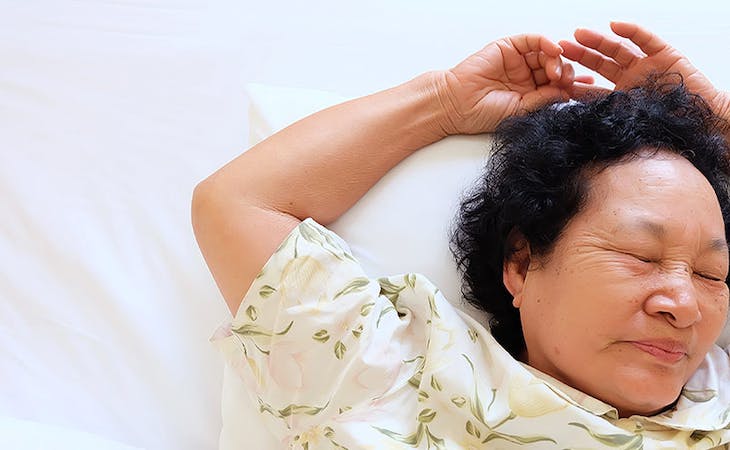There’s still a generation gap—just listen to a millennial trying to explain Instagram to a grandparent.
But when it comes to aging and sleep, it turns out the generation gap is more like a sliver. In fact, the National Sleep Foundation recently overhauled its sleep guidelines to recommend sleeping an average of seven hours a night for all adults over the age of 25—including the 65+ set.
It’s when you don’t get those seven hours of sleep that age differences really start to play out.
How sleep changes as you age
“Many younger people don’t get ideal amounts of sleep,” says Edward S. Goldberg, MD, founder of a concierge medical practice in Manhattan. “They have FOMO [fear of missing out], stay out later, and generally want to be in the thick of it. But when you’re much younger, and you’ve got raging hormones,” he adds, “you can have a lot more of a reserve of energy.”
For older people, on the other hand, “it’s much harder to produce that energy on demand, especially if you haven’t banked your sleep,” Goldberg says. And chances are you haven’t: According to the National Institutes of Health, insomnia is the most common sleeping problems in older adults, especially those 60 and older.
A lack of sleep, or poor quality sleep, can negatively affect a range of health indicators, Goldberg explains, noting that health risks of sleep deficits increase the older someone gets. “Many things change in terms of metabolism and hormones as we age. So a lack of sleep can lower testosterone, raise blood pressure, and increase your risk of depression.” Chronic sleep disturbance has also been linked to obesity, heart disease, and other potentially serious medical conditions.
A study by U.C. Berkeley researchers even determined that unmet sleep needs of older people can elevate the risk of memory loss. One of the study’s authors, psychology professor Matthew Walker, observed that “nearly every disease killing us in later life has a causal link to lack of sleep.”
Aging and sleep quality
One of the culprits: losing some of the ability to enter a state of deep sleep that helps us stay healthy. The shift starts around age 50, says “Sleep Doctor” Michael Breus, a Los Angeles-based clinical psychologist and member of the American Academy of Sleep Medicine. “Remember that deep sleep is the physically restorative stage where growth hormone is released,” he explains. With age, he says, the body clock tends to shift earlier, making deep sleep more elusive. Older people typically go to bed earlier, sleep less, and wake up more often.
Younger people also have the edge in the production of melatonin, the hormone that regulates sleep and wakefulness. “This one is more difficult to nail down, but as we age, the cornea of our eye begins to yellow, which prevents blue light from getting in to help wake us up and slows the production of melatonin,” Breus says. Melatonin—which Breus calls “the key that starts the engine for sleep”—starts to become deficient around age 50. (Here’s more information on melatonin and its relationship to sleep.)
Even jet lag gets worse as you age, Goldberg notes. The older you get, the more you pay for disruptions to your circadian rhythms, or 24-hour internal clock. “In other words, you get more susceptible to jet lag, even if you’re flying a route that doesn’t create jet lag,” Goldberg says. “Older people have to make much greater accommodations for jet lag than younger people—napping, putting extra days on a trip so they can adjust, paying more attention to hydration.”
Sleep tips for seniors
Dr. Goldberg gives his patients a “wish list” of habits designed to maximize sleep quantity and quality. While they are meant to apply to people of any age, they have special significance for the senior set. Here are a few of his top tips:
- Have a set sleep time and a set wake-up time. This is a case where being older or retired can help, Goldberg observes, because it’s easier to stick to a regular sleep schedule.
- Try not to eat for about three hours before bedtime.
- Don’t consume liquids for two hours before bed, “so you don’t have to get up and pee,” Goldberg says. “And avoid alcohol.”
- If you’ve got any kind of sleep disorder, try to exercise as early in the day as possible, preferably not within eight hours of bedtime. If you’re otherwise healthy, exercise is a great sleep aid.
- Set the stage for sleep at least an hour before bedtime. Dim the lights. Unplug from electronic devices. Turn down the volume in general. And don’t engage in work activities. Older people may find this easier to do than younger sleep-seekers, Goldberg acknowledges, but it’s worth the effort—no matter your age—to try.




